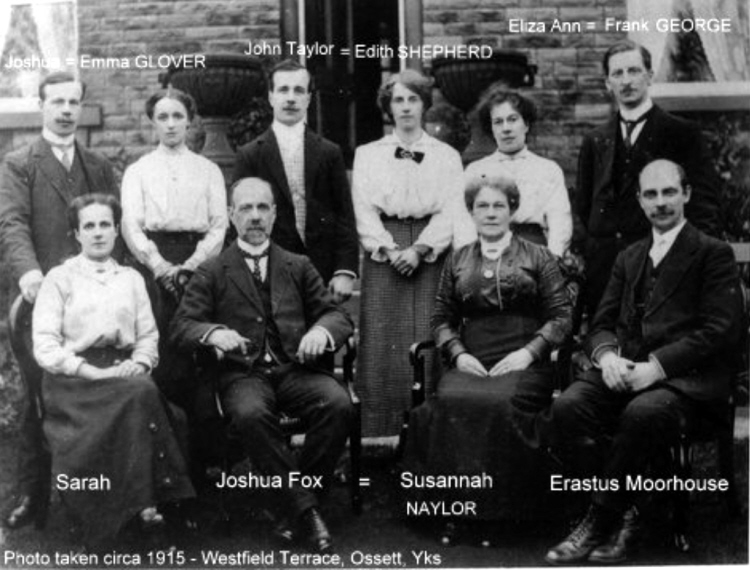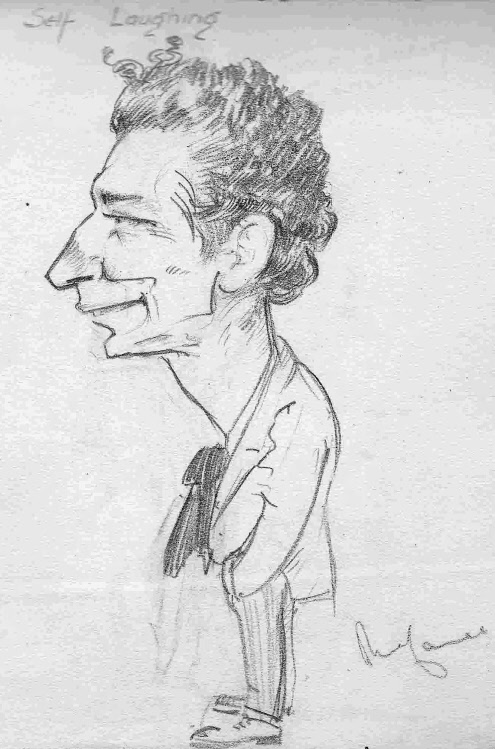
Joshua Fox Taylor was born in in the September quarter of 1888 in Ossett, the son of Joshua Fox Taylor, born in Barnsley in 1863 and his wife, Susannah (nee Naylor) born in Darfield, Barnsley in 1864. The couple had married in Wakefield in the June quarter of 1882. In 1901, the couple are now living at Headlands, Ossett with their four children: Sarah Ellen F. Taylor, aged 20 years, a teacher of music, Eliza A. Taylor, aged 16 years, Joshua F. Taylor, aged 12 years and John Ezra Taylor, aged 10 years. Joshua Fox Taylor senior is a teacher of music and a rag dealer in his own account. He died on the 6th March 1929 aged 66 years and there is a fine memorial stone at the Wesleyan Burial Ground at St John’s, South Parade, Ossett.
In the September quarter of 1911, at Ossett, rag merchant, Joshua Fox Taylor, aged 22, married Emma Glover, aged 21 years, of ‘Ferndale’, Dale Street, Ossett, the daughter of rag merchant and marine store dealer, James Clay Glover and his first wife, Jane (nee Pickersgill), who married in 1889. Joshua and Emma Taylor had at least two children: Joshua Fox Taylor III, born in 1912, and a daughter Annie Taylor, born in 1913. The Taylors lived in Runtlings Lane, Ossett.

Above: Joshua Fox Taylor (1888 – 1966) and his wife Emma (nee Glover) are shown standing on the top left of this picture. The rest of the Taylor family including patriarch, also Joshua Fox Taylor are shown on the picture, which is courtesy of Annette Watson, Lismore, NSW, Australia, the great-grandaughter of Joshua Fox Taylor (1863 – 1929).
On the 24th June 1916, Joshua Fox Taylor was conscripted into the British Armed Forces. On the 12th December 1916, at Pontefract, Taylor underwent a medical examination, carried out by an army medical officer, and was declared fit for service. However, it was noted that he had ‘defective teeth’ and he also claimed to suffer from asthma.
Joshua Fox Taylor was called up for service on the 11th October 1917, at Dewsbury. On his enlistment papers, which have survived, Taylor stated his religion as a Quaker and gave his address as Runtlings Lane, Ossett. He was employed as a rag merchant working in his own right, but refused to sign his enlistment papers to certify that what he has given verbally is correct. In addition, Taylor refused to give his next-of-kin or inform the authorities of his marital status or whether he had children. He was 5’ 6” tall, weighed 131 lbs and, at the time, was 28 years and 155 days of age.
Private Joshua Fox Taylor was deemed to be enlisted and he was subsequently posted to the 3rd Battalion of the York and Lancaster Regiment. On the 12th October 1917, he was placed in guard detention and on the 20th October, he was tried by court martial at Pontefract for disobeying a lawful command given by his superior officer, found guilty and sentenced to six months imprisonment with hard labour. By the 24th October 1917, he had been transferred to Wormwood Scrubs prison, and appeared before the Central Tribunal on the 7th December 1917. He was offered, and he accepted, the Home Office Scheme, and on the 14th December Taylor was sent to Knutsford Work Centre, Cheshire to be employed on work of national importance under the direction of the Peace Committee.
Joshua Taylor was later transferred to the Wakefield Work Centre, which, like Princetown (Dartmoor), was a former prison, with the locks taken off the doors, and inmates wearing plain clothes. The inmates were free to walk away, but with the sanction that they would be arrested and returned to prison. It is believed Taylor served here for the rest of WW1, before being discharged in 1919.
Early in WW1, Wakefield was a prison, housing civilians serving sentences of imprisonment for various crimes, plus possibly some prisoners on remand awaiting trial. In October 1916, when the Home Office Scheme was devised to provide some solution to the scandal of thousands of COs in prison, serving no useful purpose to anyone, Wakefield was cleared of prisoners by sending them to other gaols, locks were taken off the cell doors, the entrance gate was no longer permanently shut, and it was available to receive conscientious objectors wearing plain clothes, not prison uniform, released from prison on licence so long as they accepted civilian work under civilian control in the newly declared Wakefield Work Centre.
Outside work hours, in the evenings and on Sundays, they were free to go outside, and inside they could elect committees to make representations to the manager, who was not a prison governor, and for other purposes. They were able to create sports activities, social clubs etc., entirely unlike the then prison regime.
In 1918, the Home Office, seeking to make an example of the absolutist COs still languishing in prisons elsewhere, cleared Wakefield of COs, dispersing them to other Work Centres, and at public expense ordered new locks for the cell doors, kept the gate regularly shut, and collectively confined the Absolutists gathered from prisons from around the country to the newly redesignated Wakefield Prison. As anyone with the least understanding of Absolutists could have foreseen, if Absolutists could be difficult to manage in small groups among other prisoners, they could be much more difficult herded together, and so it transpired. Within a month the Home Office conceded the experiment to be a total failure, and the Absolutists were once more scattered, albeit mostly not to the same prisons from which they had been brought, and at more public expense the locks were again removed, the gate was once more kept regularly open., and conscientious objectors were again returned to the once more recreated Wakefield Work Centre, which remained until the dissolution of the Home Office Scheme in April 1919.
Joshua Fox Taylor, aged 77, died in the Wakefield area in 1966.
In late 2008, an autograph book belonging to Emma Glover was advertised for sale on Ebay and Ossett historian Neville Ashby noted that it was up for sale and asked if Emma was a relation of a mutual friend of ours, Richard Glover, of Kingsway, Ossett, a former owner of Gedham Mill, Ossett. Richard expressed an interest in it, and it was purchased on his behalf by Neville. The autograph book contains drawings, notes and poems, which appeared to be penned by conscientious objectors who had been in various WW1 work centres or prisons in different parts of the United Kingdom.

Above: Pencil sketch from Emma Taylor’s CO scrapbook which is believed to be her husband Joshua Fox Taylor.
Coincidentally, Joshua Fox Taylor’s son, Joshua Fox Taylor III, born in 1912 also served time in prison in 1940, but in his case, it wasn’t for his moral convictions as a conscientious objector like his father, but for common theft. This report appeared in the national press in 1940:
“Lorry Load Of Stolen Goods – Petrol Engine Buried In Garden – Systematic thefts from a Blyborough farm on which he was employed resulted in Joshua Fox Taylor (28), a native of Ossett, being sentenced to a total of one year’s imprisonment at Gainsborough Petty Sessions yesterday.
A lorry load of stolen parts, including a petrol engine, parts of ploughs and other farm implements, of the total value £117 17s 6d. was brought to court. The articles were stolen from the Blyborough Hall farm of Mr. H. Dickinson.
Taylor also admitted stealing quantities of paint and tools, valued at £10 15s 6d., the property of the Yorkshire Electric Power Company. Joseph Edward Searby, foreman carpenter employed by Mr. Dickinson, how he saw, from a false roof of Taylor’s cottage, parts of ploughs and farm implements in the front bedroom.
Detective Brewster said that when he cautioned Taylor regarding the missing petrol engine, accused said he had buried under a refuse heap in his garden. Witness recovered the engine.”